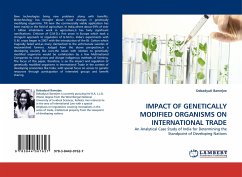
IMPACT OF GENETICALLY MODIFIED ORGANISMS ON INTERNATIONAL TRADE
An Analytical Case Study of India for Determining the Standpoint of Developing Nations
Versandkostenfrei!
Versandfertig in 6-10 Tagen
32,99 €
inkl. MwSt.

PAYBACK Punkte
16 °P sammeln!
New technologies bring new problems along with benefits. Biotechnology has brought about novel changes in genetically modifying organisms. Till now the commercially viable application has been mainly in the field of agriculture. In India,where about 59% of over 1 billion inhabitants work in agriculture,it has fairly significant ramifications. Criticism of G.M.O.s first arose in Europe which took a stringent approach to regulation of G.M.O.s. India's experiments with G.M. crops began in 2007 with the introduction of the Bt. Cotton which tragically failed and,as many claimed,led to the unfortuna...
New technologies bring new problems along with benefits. Biotechnology has brought about novel changes in genetically modifying organisms. Till now the commercially viable application has been mainly in the field of agriculture. In India,where about 59% of over 1 billion inhabitants work in agriculture,it has fairly significant ramifications. Criticism of G.M.O.s first arose in Europe which took a stringent approach to regulation of G.M.O.s. India's experiments with G.M. crops began in 2007 with the introduction of the Bt. Cotton which tragically failed and,as many claimed,led to the unfortunate suicides of impoverished farmers. Judged from the above perspective,in a developing country like ours,the issues with relation to genetically modified organisms would be cartelization by a few Multinational Companies to raise prices and disrupt indigenous methods of farming. The focus of this paper, therefore, is on the impact and regulation of genetically modified organisms in International Trade in the context of developing economies like India, with special focus on access to genetic resources through participation of interested groups and benefit sharing.












